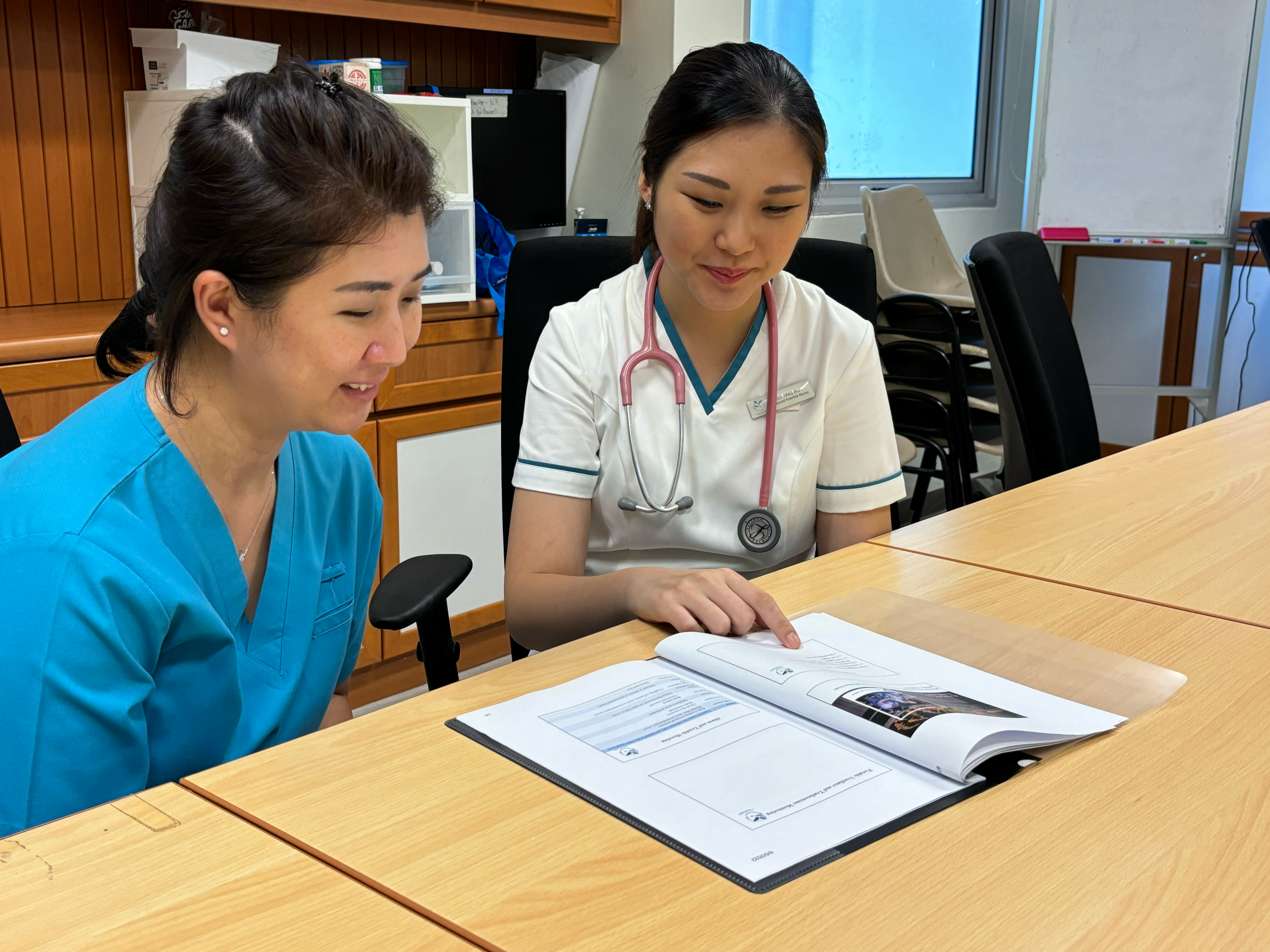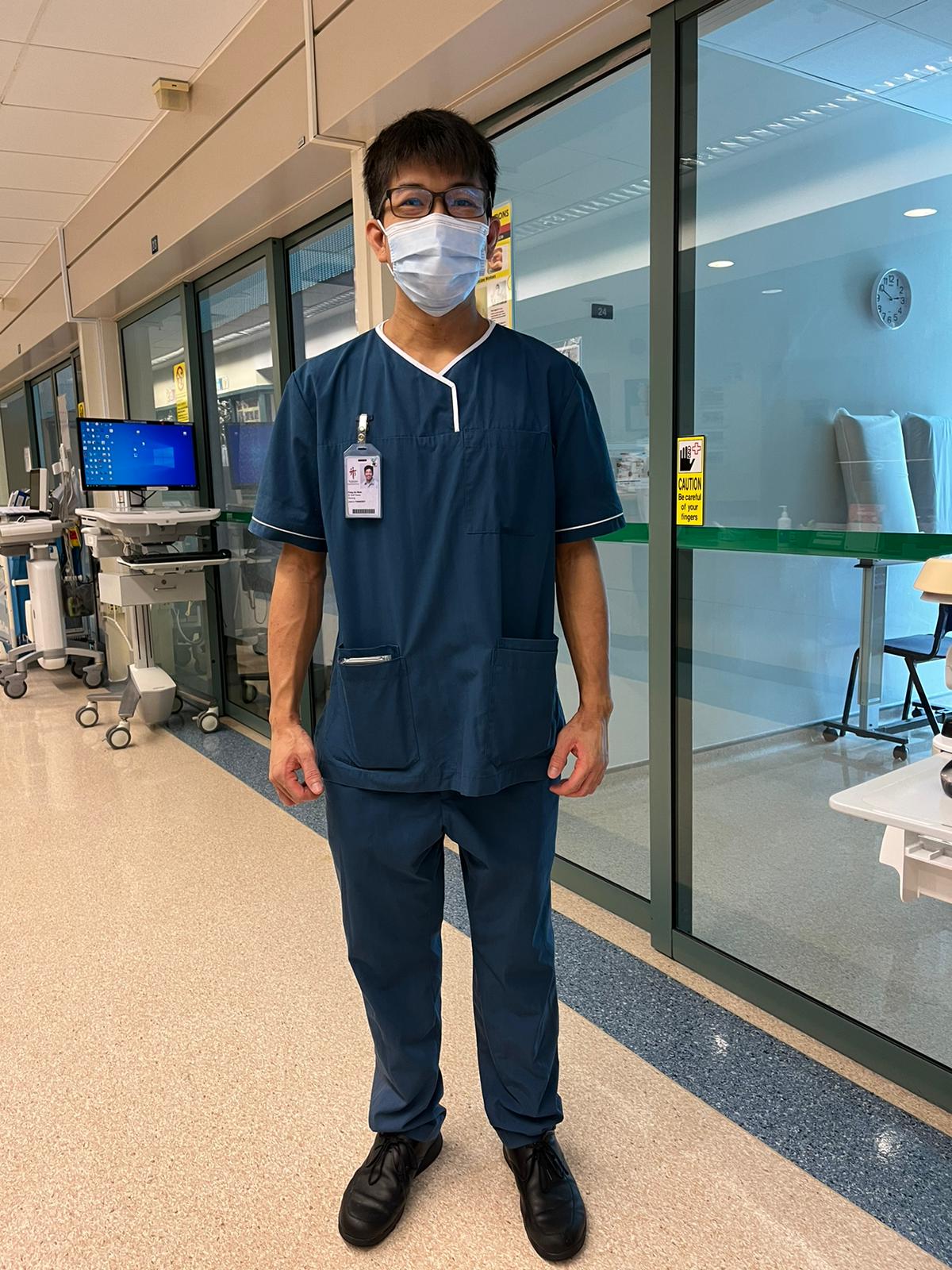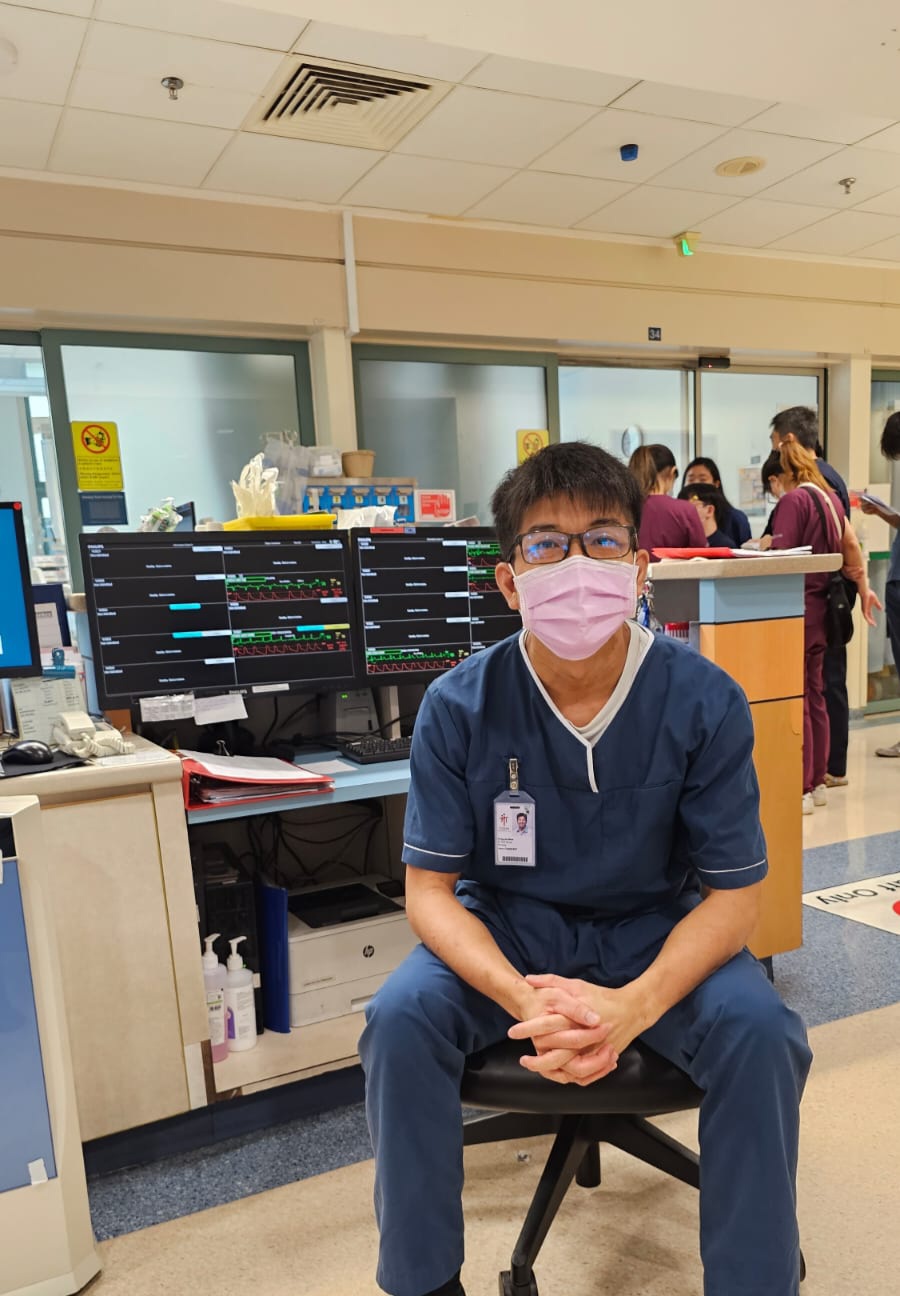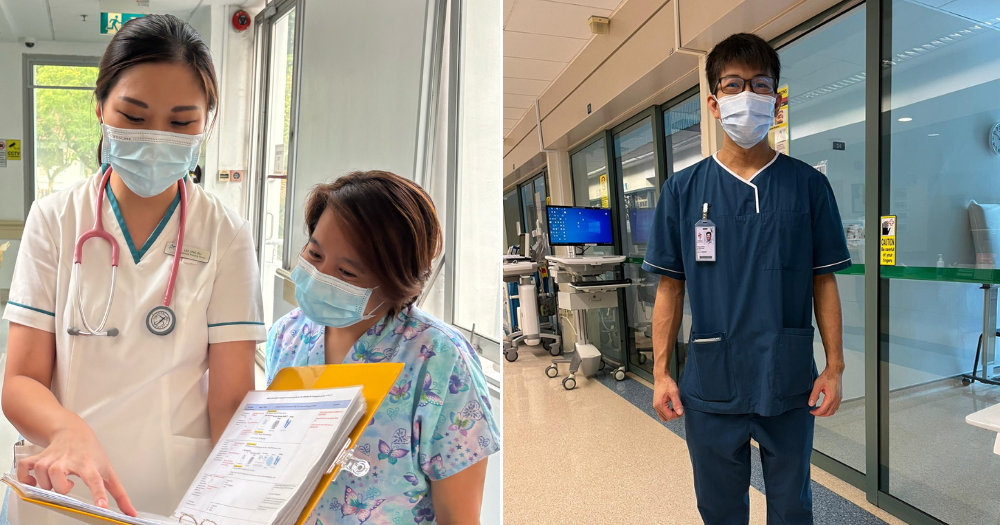"We grieve when our patients pass on," shared Lee Jing Ru, a palliative care nurse.
Lee, 31, has worked at Dover Park Hospice for the past decade.
She provides care for patients with advanced, life limiting illnesses, who typically have less than three months to live.
 Image from Dover Park Hospice.
Image from Dover Park Hospice.
One might think death is something nurses like Lee might get accustomed to.
Lee went into this specialisation immediately after earning her nursing degree, so that she could better take care of her ailing grandmother in her final days.
However, she admitted that nurses like her never really get desensitised to the loss of their patients.
And just like the families of the deceased, they also grieve.
Handling a terminal diagnosis
Lee and her team once journeyed with a patient in his 50s, who had terminal brain cancer.
After the doctor broke the news to his wife and young children, they struggled to accept that his condition was deteriorating.
The reality was that he would soon pass on.
Lee admitted that – even after her years of service – her biggest difficulty is still coping with the moment when her patients pass on.
When supporting the grieving family, Lee knew that words need not be said at the time.
The more important thing was to be emotionally present, which Lee did when spending time with them.
Supporting the family to find closure
As a palliative care nurse, Lee was clear about her role – to keep the patient as comfortable as possible through quality nursing care, and to give the family time and space to grieve.
As the patient was experiencing severe headaches, Lee worked with doctors to adjust the dosage of his medications and provide some relief during the final lap.
The family, initially at a loss for how to support their father, was taught Namaste Care, a therapeutic hand and face massage.
Later, Lee was touched to see the family spending more time with the patient at his bedside, with simple gestures of aid like cleaning his face and massaging his hands.
“These small gestures mean so much to patients at the end of life,” she said.
Before the patient passed on, the family was guided to say the four things that mattered: “Sorry”, “Thank you”, “I love you”, and “Goodbye”.
This was pivotal in giving the family some form of peace and closure, Lee noted.
She shared that sometime later, the family returned to the hospice to thank the team.
The man’s children also shared that they would study hard and not let their father down.
Light a candle for the departed
 Image from Dover Park Hospice.
Image from Dover Park Hospice.
Given the nature of their work, the hospice supports their staff in processing their emotions on a regular basis.
Every week, during multidisciplinary team meetings, the clinical team will light a candle and have a minute of silence for patients who have passed on.
Other ways to lift the team's spirits include team bonding sessions, massage sessions and aromatherapy, Lee noted.
"It's so that we can all have closure and continue to do what we do," Lee explained.
Teaches her to cherish what she has
While some might view it as a depressing job, Lee says that ultimately it is a meaningful one.
To Lee, her work is about journeying with patients as they embark on the final phase of their lives.
"I am in a special and privileged position, to be able to look after them at the most vulnerable time of their lives. This gives me meaning and purpose at work," she shared.
Lee also admitted that it has changed her outlook on life.
"It teaches me to live every moment to the fullest and cherish what I have," she said.
ICU nurse
Another nurse who knows what it is like to face death on a daily basis is critical care nurse, Fong Jia Shun.
The 34 year-old is an Intensive Care Unit (ICU) nurse at Woodlands Health (WH).
Fong is currently working at Tan Tock Seng Hospital ahead of WH’s opening.
 Image from Woodlands Health
Image from Woodlands Health
ICU nurses typically treat higher-risk patients who need close monitoring of their health conditions, in case of deterioration.
Walking the line between life and death
Fong shared that in his line of work, seconds can mean the difference between life and death.
He has nursed patients who were involved in road traffic accidents, young parents with respiratory or cardiac failure, as well as emotionally unstable patients who sought to end their lives.
And while most patients might be unconscious or sedated when brought into the ICU, others might come in conscious but confused, and could even be frantically trying to pull out their life support tubes.
Tense scenarios in the ICU
Conditions could also escalate in a matter of minutes.
For instance, Fong had a middle-aged patient who was admitted for pneumonia, which causes inflammation in the lungs.
However, this soon worsened into acute respiratory distress syndrome, where fluids build up in the air sacs of the lungs and prevent the body from taking in oxygen.
He experienced severe breathing difficulties as a result.
Doctors, respiratory therapists and other nurses carried out multiple interventions, but these were to no avail.
The ICU team soon realised the disease had progressed to an advanced stage, and the devastated family struggled to accept the bad news.
Maintaining composure with empathy
Fong shared that this was the greatest challenge as an ICU nurse – to maintain composure in spite of volatile or unpredictable situations.
In the course of his job, he might have to transition from an all-hands-on-deck emergency where every second counts, to emotional situations like these with grieving families.
Fong said he would need to mentally change gear, in order to be more sensitive and empathetic for the families.
“It is a challenge because we are all human beings but we have to be strong for our patients and their families,” he said.
Apart from rendering medical assistance, Fong planned for the family members to spend more quality time with the patient in his final hours.
It was a tragic situation, but one that reminded him of the saying, “hold your loved ones close and cherish every second together.”
Bringing joy to patients
Fong also takes pride in the light-hearted side of his work — bringing joy to patients during their ICU stay – as part of the hospital’s focus on patient-centred care.
For example, the nurses would let patients play with toys and board games, or give them leisure activities like colouring, listening to the radio or watching movies on an iPad.
One of Fong's fondest memories was when he was taking care of a patient who had to stay in the ICU for months.
On the man's birthday, Fong and his colleagues surprised him with a cake and took some photos to commemorate the occasion.
The man also had difficulties grooming himself.
After consulting the man’s family, Fong and the other nurses agreed to lend a hand, giving him a haircut and a shave.
Wants to be there for patients at their weakest
 Image from Woodlands Health
Image from Woodlands Health
Nursing is a calling that is close to Fong’s heart.
Initially, he had enrolled in nursing studies in search of a career that would bring meaning.
And the skills he learnt in school were handy when he was able to save his grandmother from cardiac arrest – twice.
Perhaps that was an indication that he was destined for the high-risk, fast-paced nature of ICU work.
Fong says he chose critical care for the "adrenaline rush", and embraces the challenges that will come his way.
"I want to be there for my patients when they are at the weakest point in their lives, to provide them with all the help they can get," he explained.
Healthcare Scholarships offered by MOH Holdings (MOHH)
While death may be a heavy topic to grapple with, I am glad that there are nurses out there like Lee and Fong who strive to support patients and families facing life and death situations.
Not only do they find their work meaningful, they will touch many lives through their roles as nurses.
For those interested in pursuing a career in nursing, Fong suggested they can apply to hospitals that offer job shadowing opportunities or internships to experience the work first-hand.
They can also speak to nurses in the sector, or attend open houses at educational institutions offering nursing courses to find out more.
Additionally, MOHH is offering Healthcare Scholarships to polytechnic, and junior college students, as well as those who are currently pursuing nursing in NYP, NP, NUS or SIT.
The scholarship application window is now open.
You can visit the website for more information.
This sponsored article by Healthcare Scholarships reminded this writer that life is shorter than we think it is, and we should treasure every moment we have.
Top image from Dover Park Hospice / Woodlands Health.
If you like what you read, follow us on Facebook, Instagram, Twitter and Telegram to get the latest updates.

